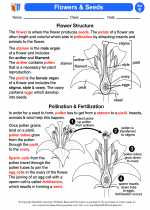Flowers and seeds -> fossil fuels
Fossil Fuels
Fossil fuels are natural resources formed from the remains of ancient plants and animals. They are called "fossil" fuels because they are formed over millions of years from the fossilized remains of organic matter.
Types of Fossil Fuels
There are three main types of fossil fuels:
- Coal: Formed from the remains of plants in swampy environments.
- Oil (Petroleum): Formed from the remains of marine plants and animals.
- Natural Gas: Formed from the remains of tiny sea creatures and organic matter.
Formation of Fossil Fuels
Fossil fuels are formed through a process called "carbonization" where the organic matter is subjected to high pressure and heat over millions of years. This process transforms the organic material into coal, oil, or natural gas.
Importance of Fossil Fuels
Fossil fuels have been a vital source of energy for human civilization. They are used for electricity generation, heating, transportation, and industrial processes.
Environmental Impact
While fossil fuels have provided abundant energy, their use has also led to environmental issues such as air and water pollution, and the release of greenhouse gases contributing to climate change.
Study Guide
Here are some key points to remember about fossil fuels:
- What are fossil fuels?
- Types of fossil fuels and their formation.
- Importance of fossil fuels in human civilization.
- Environmental impact of fossil fuel use.
- Alternatives to fossil fuels for sustainable energy.
Understanding the formation, types, uses, and impact of fossil fuels is essential for understanding the role of energy sources in our world and the importance of seeking sustainable alternatives.
Hope this helps!
[Fossil Fuels] Related Worksheets and Study Guides:
.◂Science Worksheets and Study Guides Fifth Grade. Flowers and seeds

 Activity Lesson
Activity Lesson
 Worksheet/Answer key
Worksheet/Answer key
 Worksheet/Answer key
Worksheet/Answer key
 Worksheet/Answer key
Worksheet/Answer key
 Worksheet/Answer key
Worksheet/Answer key
 Vocabulary/Answer key
Vocabulary/Answer key
 Vocabulary/Answer key
Vocabulary/Answer key
